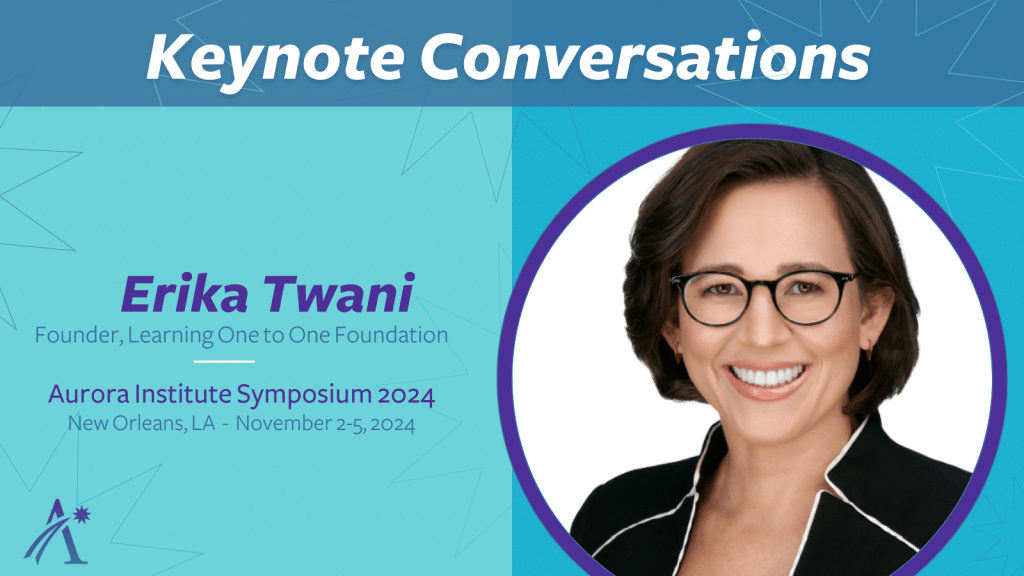In Conversation with Erika Twani, Founder of the Learning One to One Foundation and Aurora Institute Symposium 2024 Keynoter
CompetencyWorks Blog
Aurora’s Communications Director Chiara Wegener recently had the chance to sit down with Learning One to One Foundation’s Erika Twani, who will be keynoting at the Aurora Institute Symposium 2024 in New Orleans this November.

CW: It’s great sitting down with you today, Erika! I’m wondering if you could share a little bit about your professional journey, and what led you to found the Learning One to One Foundation.
ET: I’m a software engineer by design. I’ve always loved working with technology, but it’s a lot better working with people! This led me to the ed tech space, where I saw the difference a personalized learning experience can make in a student’s life. I completely fell in love with education. I worked for big corporations like Microsoft, but I gave up on the corporate world to start the Learning One to One Foundation, where we focus on research development and the implementation of learning innovation, with a particular focus on learning autonomy – or self-directed learning – which aligns with the work that Aurora is doing.
CW: In 2021, your book Becoming Einstein’s Teacher was published, which centers around this idea of awakening the genius in learners. Can you tell us more about what this means?
ET: When children are little, they ask deep questions such as “Why is the sky blue?” or “Where does the rain come from?” Children have this creative, genius way of thinking when they are young. Still, they often lose that genius as they grow within a traditional education system shaped around compliance. I believe that if we could cultivate the genius that so many of our youngest learners possess, we would be able to solve so many thorny issues! As students grow up, their minds become conditioned to seek the approval of others, but we can transform that mindset when we bring back that genius from within. That’s the whole point of my book.
CW: That really resonates with me, especially personally! I have a kindergartener who has just started in the K-12 system. She is innately curious, and so creative! But I’m already feeling this sense of pushback from the system, even in small things like all of the worksheets that I pull out of her folder each day.
ET: Yes. Unfortunately, it’s because we’re all conditioned to follow this system – it’s all set for us. There’s not often room for creativity. I see the work that Aurora is doing to push back on this notion – and there’s a lot of overlap between my work and that of Aurora’s.
CW: How do you see this notion of awakening the genius in students aligned with Aurora’s focus of advancing personalized, competency-based education?
ET: The word ‘genius’ comes from the Latin word, genii–to produce, create, to give birth to. It’s something that comes from within. And the word education comes from the Latin word ‘educare,’ which means to bring forth from within. So both words require an action of bringing forth–giving students agency to take action.
Today, in a traditional education system, educators do a lot of the work, and oftentimes, the genius of students is suppressed by the system. However, students can drive their own learning experiences in a competency-based system.
For example, I was once working with a student who disliked biology but loved cars. But once he could think about biology through car metaphors–for instance, when thinking about the digestive system–the food is gas, the stomach is the engine–he was much more interested and motivated.
CW: From your perspective, how does AI fit into this conversation? I know this is something you’ve thought a lot about; but I’m wondering how you might respond to this narrative of advancements in technology killing originality and creativity?
ET: Generative AI can provide us with information, but only the human mind can link concepts together and create something new. AI can help us learn, but only humans can put concepts together.
Now, if you’re looking at AI within the traditional education system, it can seem scary because it can look like it’s killing creativity. What we view as ‘creative’ in the traditional system is something like following instructions to put a project together or reading a book. But how I’m viewing creativity, and I think you all at Aurora view it, is through a different lens…we’re going to discuss this in my keynote address!
Let me give you an example. Imagine that students have a project related to cleaning up the ocean. They might use AI to conduct research, create a concept paper, and help find investors on LinkedIn. AI can also write code, prototype an app, or create a PowerPoint deck.
These students are not experts on environmental cleaning. They have never met investors before and are not presentation designers or coders. But they know how to ask questions – or create prompts, and they have the right support system – teachers – to guide them through this journey.
CW: We can’t wait to see you in November! What are you most looking forward to about our Symposium?
ET: I plan on attending the whole conference, so I want to connect with teachers and leaders each day. I hope you might be interested in exploring my book prior to coming to the convening so we can talk more about it. I’d love to learn about your experiences, and what pieces of the book resonate with you. Can’t wait to see you in New Orleans!